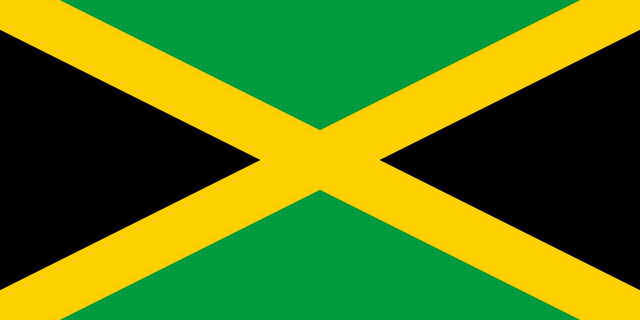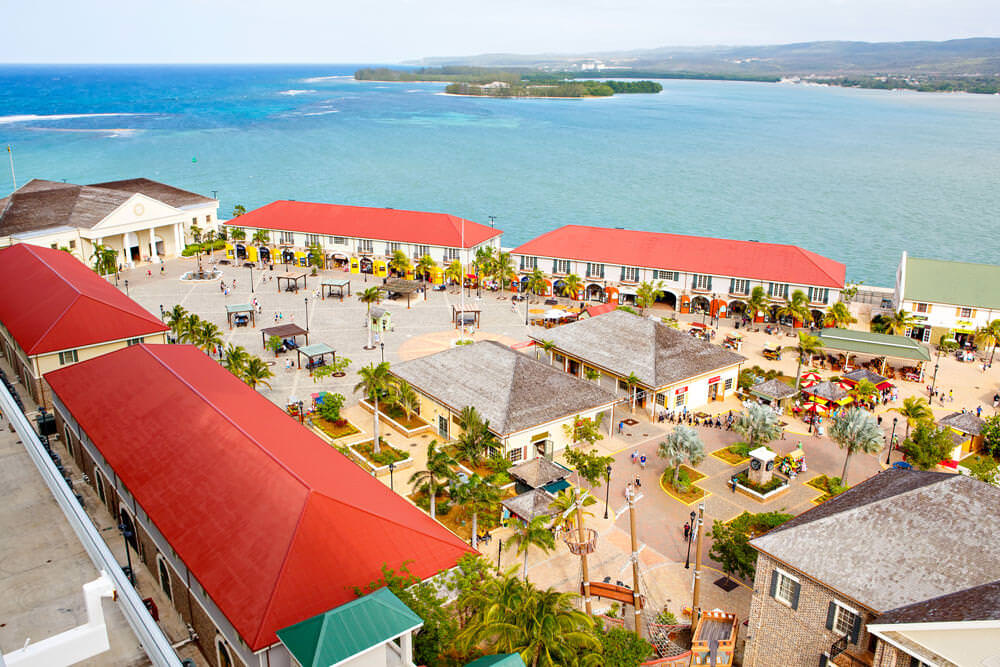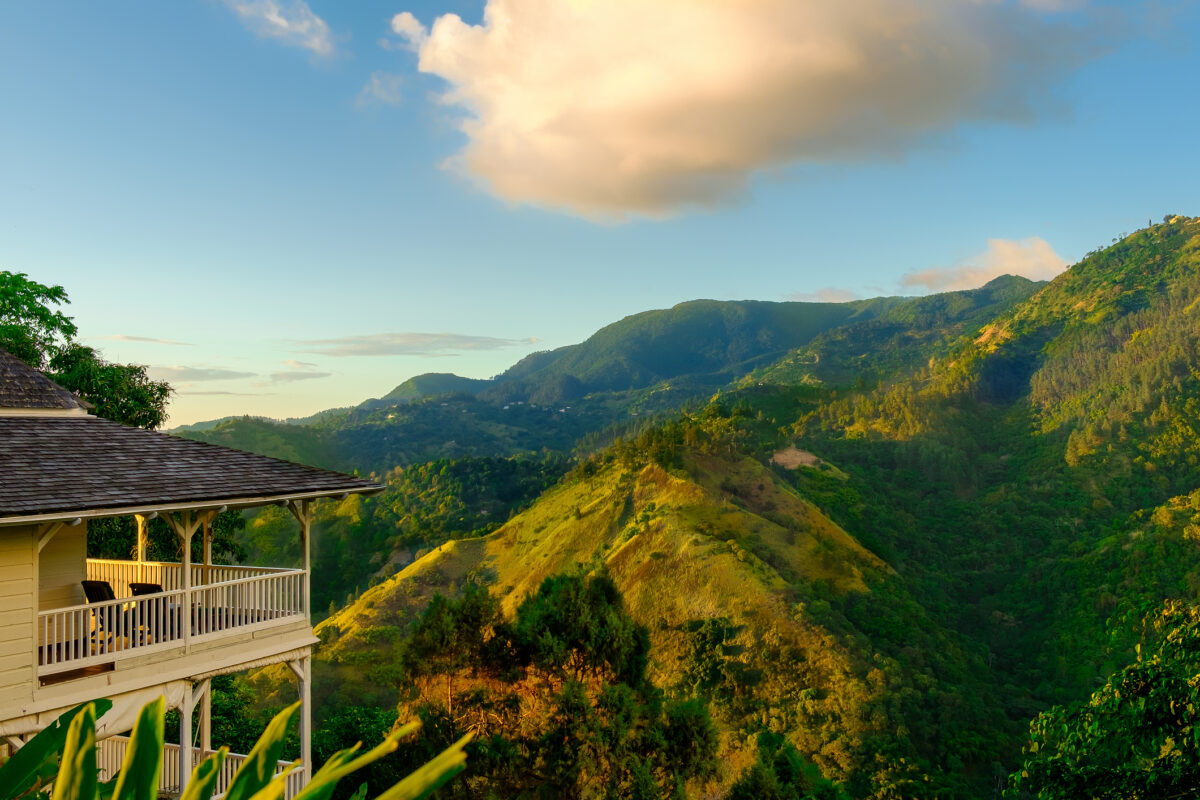Jamaica

Capital city: Kingston
Population: 2,973,463 (2021)
Land area: 10,991 km²
Official language: English
Legal system: Common Law system
Time zone: GMT-5
Currency: Jamaican dollar (JMD)
GDP: 14.6 USD Billion (2021 est.)
Main industries: Tourism, bauxite/alumina, food processing, light manufactures, rum, cement, metal, paper, chemical products, telecommunications
Principal exports: Aluminum and bauxite
History
Evidence suggests that the first inhabitants on the territory of present-day Jamaica were the “Redware people” in 600 CE, named after the distinct culture and usage of red pottery, the remnants of which were left behind. A second wave of migration in about 800 CE saw the arrival of the Arawakan-speaking Taino people who settled across the island and built a foundational economy on fishing and the cultivation of corn and cassava; these settlements were spread across villages, each led by their own caciques (chieftans).
Christopher Columbus made landfall in 1494 and on his second visit spent a year shipwrecked on the island from 1503-1504. 5 years later, the Spanish colonist, Juan de Esquivel, laid the foundations for the first European settlement on the island on the northern coast in the town of Sevilla de la Vega (New Seville). Due to their settlements and outbreak of European diseases, the Taino population dwindled down to almost zero by the 17th century. The very first British expedition to the island took place in 1655 under the command of Admiral William Penn and General Robert Venables; upon arriving and over the next 5 years, the British began to slowly expel the Spaniards while the latter’s enslaved labourers, labelled the “Maroons”, escaped into the highlands and built defensive settlements, hunting and cultivating plots of land to grow plantains, yams and herbal medicines. Buccaneers, more or less pirates, were urged to settle on the island by the British forces in an effort to protect against any attacks by the Spanish as well as to launch offensives on Spanish Caribbean cities and trade posts. Ultimately, in 1670, Spain recognised Britain’s claims on Jamaica in the Treaty of Madrid after which the British forces began to rein back and arrest buccaneers who were still continuing their conquests.
Following the creation of the Royal African Company in 1672, Jamaica quickly became one of the most valuable agricultural processing centres, particularly for the production of sugar, indigo and up, until 1671, cacao. Sugar production reached its pinnacle in the 18th century; however, this was harmful to the local economy especially for landowners of small estates and plantations who struggled to profit due to the spike in production costs. They later began to focus on coffee and indigo production, the former becoming successful enough to rival sugar exports in volume. Following the bitter Maroon Wars and slave revolts throughout the 18th and 19th centuries, the Jamaican assembly was driven to give its power to the Governor of the time, Edward John Eyre, who imposed martial law and brutally cracked down on the rioters and their key convening personality, Paul Bogle, and assembly member George William Gordon, the alleged co-conspirator. Though some applauded his actions, public backlash and an official investigation that took place in Britain resulted in his dismissal shortly after. In 1866, the Parliament officially declared Jamaica a crown colony with a new governor, John Peter Grant, who led executive and legislative decisions. Following his assignment, he made several constitutional changes; he appointed local magistrates, reformed the judicial system, established a police force and most notably developed a better irrigation system for the fertile plains in between Kingston and Spanish Town which was at the time suffering from severe droughts. The British gradually restored representative government, reserving 14 seats for local representation by 1895.
In 1870, American sailor Captain Lorenzo Dow Baker, was travelling from Orinoco to Jamaica and began an experimental business of importing Jamaican bananas to America which grew to become an immensely successful business. This was the start of Jamaica’s export of the fruit, which soon after became a principal export rivalling its sugar trade. While economic uptrends continued, the growing class of professions of mixed African and European ancestry began to call for greater representation and overall dissatisfaction with the government administration grew to a boil when the Great Depression that took place in the 1930s exacerbated economic, social and political tensions till a widespread riot broke out in 1938. Following this, Jamaicans set up their first ever labour unions which then gave support to the local political parties in their demands for greater self-determination. In 1944, the House of Representatives was officially established with the members to be elected by universal suffrage along with nominations for an Executive Council and a Legislative Council which was to function as an upper house with limited vested power. The constitution was altered in 1953 to accommodate elected government ministers and in 1957 the Executive Council was converted into a cabinet with the premier instated as the chairman.
A year later, Jamaica became one of the founding member nations of the West Indies Federation with the leader of the People’s national Party (PNP), Norman Maley, becoming the premier following Jamaica’s obtainment of complete internal self-government in 1959. However, just a year later, the leader of the Jamaica Labour Party, Sir Alexander Bustamante, called for Jamaica to secede from the Federation; due to the widespread support of his demands, a referendum was held in 1961 and after having won majority vote, he went on to become the overall winner of the general elections that took place in April 1962. Just a month after Bustamante became premier, the Federation was dissolved.
Jamaica became independent with Alexander Bustamante of the Jamaica Labour Party (JLP) as prime minister in 1962 and joined the Commonwealth in the same year. Jamaica is famous for having won medals in every Commonwealth game since 1934. From 1962 to 1972 there was focus on the development of infrastructure and in technical, vocational, and academic faculty education. In 1972 the PNP leader Michael Manley, son of Norman Manley, implemented PNP’s democratic socialist ideological foundations through efforts to increase literacy, access to higher education, and home ownership; removing laws that discriminated against women and against children born out of wedlock. In contrast to the policies of the JLP prime ministers that came before him, Manley adopted more conservative policies during his second term and cooperated closely with the IMF, deregulated the financial sector, and floated the Jamaican dollar. He retired in March 1992 and was replaced by P.J. Patterson.

Key dates
1884 New constitution introduced- revives local autonomy
1938 People’s National Party (PNP) founded by Norman Manley in the background of severe riots due to racial British policies causing resentment and unemployment
1944 Universal adult suffrage introduced; new constitution set up for a popularly elected House of Representatives.
1958 Jamaica becomes a member of the Federation of the West Indies.
1961 Jamaica withdraws from the Federation of the West Indies.
1962 Jamaica becomes independent; Jamaica Labour Party (JLP) leader Alexander Bustamante becomes Prime Minister
1972 PNP leader Manley becomes PM in the general elections and pursues a policy of economic self-reliance.
1992 Manley retires on health grounds and is succeeded by Percival J Patterson.
2006 Local government minister Portia Simpson Miller is elected as head of the ruling People’s National Party. She becomes Jamaica’s first female PM in March.
2007 September – Jamaica Labour Party wins general elections, Bruce Golding becomes PM.
Legal System and Government
Jamaica is a parliamentary democracy under a constitutional monarchy. The prime minister is considered the head of government and is appointed by the leading political party’s members in parliament. The Queen of England is the titular head of state who appoints a governor-general by the advice of the prime minister. The governor-general performs a largely ceremonial role while the cabinet, which includes the prime minister and 11 selected ministers, is the predominant decision-making body. Jamaica’s Parliament comprises the Senate which is known as the Upper House and the House of Representatives known as the Lower House. The bicameral parliament’s House of Representatives has 63 members all of which are directly elected for a term of 5 years. The Senate consists of 21 members of which 13 are appointed by the governor-general on the advice of the prime minister and 8 seats are reserved for members selected on the advice of the opposition’s party leader. The president and deputy president of the Senate are elected by members of the Senate.
Jamaica respects English common law in its courts. In contrast to many other legal systems, Jamaica’s highest court is the Court of Appeal. It handles appeals from both inferior courts and from the Supreme Court; however, some cases can be heard by the United Kingdom’s Privy Council.
Economy
Jamaica is an upper-middle income economy with a mixed economic system balancing private freedom, centralised economic planning and government regulation. While the dependence on the services sector for GDP revenue has been decreasing in the past couple of years, it still contributes 64 per cent of GDP as of 2021, largely through the tourism industry that on its own makes up 15 per cent of the GDP, as well as commercial services, remittances, telecommunications, transport and outsourcing. The services sector also employs majority of the Jamaican labour force, currently employing an approximate 68.6 per cent.
The second largest sector for Jamaica after services is its industrial sector which makes up 20.8 per cent of the annual GDP and employs 16.2 per cent of the labour force; manufacturing makes up around 8 per cent of the GDP revenue share. Jamaica’s main industries include bauxite and alumina mining alongside tourism. In fact, aluminium oxide, and ore accounts for more than half of the country’s exports. Jamaica’s agricultural sector is comparatively small, amounting to approximately 8.8% of GDP; however, this is a continuation of an upward trend compared to levels before 2010 when the contribution used to be less than 5 per cent, showcasing the government’s prioritisation of the sector’s development. Jamaica’s main agricultural products include sugarcane, bananas, coffee, citrus fruits and cocoa and the manufacturing and processing of rum has also been a popular commodity originating from the nation. The agricultural sector employs an estimated 16 per cent of the working population.
Commodity exports comprise 8.4% of GDP however this is more so due to the fact that Jamaica is a net-import country.
Trade
Jamaica’s GDP in 2021 was US$13.6 billion. For the year, exports, which amounted to US$3.1 billion, mainly consisted of inorganic and organic chemicals and compounds, precious metals and rare-earth metals (28.4%), beverages, spirits and vinegar (15.8%), mineral fuels, oils and products of their distillation (11.8%), and ores, slag and ash (7.0%). The main export destinations were the United States (46.6%), Canada (9.7%), the Netherlands (8.1%), and Iceland (6.9%). For the same year, product imports amounted to US$6.7 billion, and were mineral fuels, oils and products of their distillation (16.0%), vehicles other than railway/tramway rolling stock (8.2%), machinery and mechanical appliances (7.4%) and electrical machinery and electronics (5.7%), of which the main suppliers were the United States (39.7%), China (8.3%), Brazil (6.5%) and Japan (4.4%).
Jamaica is a central member of the Caribbean Community and Common Market (CARICOM) and enjoys tariff arrangements with the United States under the Caribbean Basin Economic Recovery Act (CBERA), with Canada under the Caribbean-Canada CARIBCAN Agreement and the European Union via the Economic Partnership Agreement (EPA).
Investment Opportunities
In 2019, Jamaica was named the best Caribbean country in the World Bank and Forbes Doing Business Indices and ranked 6th globally in terms of Ease of Doing Business and the 12th easiest place globally for getting credit in the aforementioned World Bank Report. Jamaica’s numerous accolades are the result of its well-developed transport and communications infrastructure, its leading role as the first ranking port hub in the region, stable democratic governance, high literacy rate and English speaking proficiency, diversified economy and low unemployment rate.
Jamaica is the third largest recipient of foreign direct investment (FDI) in the region due to investor confidence in its strong regulation and credit rating.
Having been voted as the Best Destination in the Caribbean in the TripAdvisor Travellers’ Choice Awards, Jamaica’s tourism sector is a vibrant and lucrative option for foreign investors. Despite COVID-19, Jamaica saw 1.6 million tourist arrivals in 2021 and as the world recovers from the global pandemic, the government of Jamaica is encouraging investment and joint venture projects such as the construction of large-scale and boutique hotels, food and sport events, business conferences, eco-tourism resorts, casino gaming and more. And due to its scenic beauty and the large contribution of the film, animation and music industry (FAM) to GDP, Jamaica is an attractive location for filmmaking and animation projects. Jamaica’s global digital services industry has been growing steadily particularly in the last 5 years and has been gaining the highest employment growth rate of any sector; the government is encouraging investments in software development, business process outsourcing (BPO), legal processing outsourcing (LPO) and knowledge process outsourcing (KPO) amongst other uptrending areas of development.
Manufacturing is a US$1.2 billion industry in Jamaica and serves as one of the main pillars of the country’s economy. As the industry continues to expand, foreign investors can find many attractive areas of interest, especially in the medicinal cannabis, agro-processing, furniture, paper products and chemical manufacturing sectors. Other sectors of investor interest also include agriculture, mining, infrastructure and logistics, energy and real estate.
Investors can avail numerous incentives and fiscal benefits if they invest in Jamaica; to list a few, upon paying taxes in full and on time, investors can access 30% employment tax credit and can claim 100% tax credit when statutory taxes are paid well in time. Manufacturing or agricultural companies may receive Value Added Tax (VAT) or General Consumption Tax (GCT) relief and registered manufacturers may receive 50% discount on Customs Administration fees and a deferment on GCT. In Jamaica’s Special Economic Zone investors can enjoy a low corporate income tax of 12.5%, duty-free imports, 10% productive tax credit for training/research and withholding tax exemptions. Additionally, companies that list on the Junior Stock Exchange are automatically exempted from corporate income tax for the first 5 years and 50% for the following 5 years.

Jamaica is the third largest state in the Caribbean, and is part of the West Indies islands. It has a land area of 10,991 km² and is located 160 km west of Haiti and 150 km south of Cuba.
Many towns on Jamaica bear English, French, and Spanish names due to the island’s colonial history. The nation’s capital, Kingston, is located on the southeast coast looking outward facing the Caribbean Sea.
More than half of Jamaica’s land is over 1,000 feet above sea level and majority of its surface comprises of mountains and plateaus, the tallest of which are the Blue Mountains located in the eastern region with a height of 7,402 feet. From the easternmost point where lay the John crow Mountains towards the Dry Harbour Mountains in the centre and the Cockpit County in the west, the topography of the landscape consists of ridges of limestone, depressions and “cockpits” which are distinct sinkholes littered across the hills and plateaus. Towards the southwest are the Don Figuerero, Santa Cruz, and May Day mountains and the southernmost region harbours the largest alluvial plains across the island nation.
Demographic
Jamaica’s population was recorded to be 2,818, 596 according to 2022 estimates. Over the last decade, Jamaica’s population growth has slowed significantly; while 43% of the Jamaican population is below the age of 25 the population has been steadily ageing. This is due to several factors, including heavy emigration to the United States and Canada. By contrast, Jamaica’s population density is high in comparison with the rest of the world. Internal migration has grown in recent years, due to an increase in bauxite mining and development of the manufacturer sector. Most Jamaicans are religiously affiliated with Christianity, either being Protestant (64.8%) or Roman Catholic (2.2%), while 21.3% of the population is said to practice no religion.
English and Jamaican Patois are widely used in the country. English is the official language in Jamaica and the language often used in formal contexts. The English spoken in Jamaica has been influenced mainly by British English due to the island’s colonial history. The Jamaican Patois is also referred to as Jamaican Creole or Patwa. Although English is the official language of the country, Jamaican Patois is most widely spoken. It is often used in informal settings. Just over half of the population lives in urban residential areas, the largest urban area being the capital of Kingston.